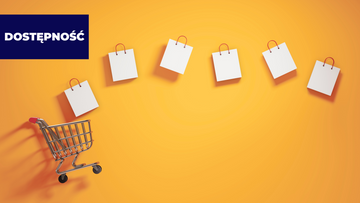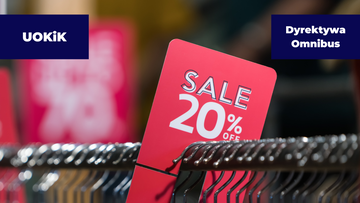Protecting your brand online: is it worth registering your trademark?
by Marcin Tomczak on Mar 18, 2024
Online store owners face numerous challenges: GDPR, Omnibus, taxes, constantly changing regulations… These are just the tip of the iceberg. Another equally challenging challenge can be the use of trademarks, such as logos, by competitors. How can you address this?
The e-commerce market is full of opportunities – the current trend in online retail encourages entrepreneurs to seize the opportunity to make their businesses successful. E-commerce is also a highly competitive environment. Every entrepreneur dreams of their store being as recognizable as possible and the most preferred choice by customers. A brand tailored to the specifics of the industry that distinguishes the entrepreneur or the services they offer can play a significant role in marketing and in influencing potential customers.
In this article, you will learn why brand protection is so important, what can be a trademark, and what benefits there are to registering a trademark.
What is a trademark?
Trademarks are a key element of identification for products or services offered by a given company. Trademarks must be capable of being represented in the trademark register. They are used in commerce and enable the distinction of similar products offered by different entities.
The essential condition for obtaining trademark protection is to meet two criteria simultaneously.
First, a trademark must be capable of clearly distinguishing the goods or services of one company from another. What does this mean in practice? The mark must possess unique characteristics that allow customers to easily distinguish the products of one company from another.
Secondly, the mark must be capable of being represented in the trademark register.
When is a trademark eligible for registration in the trademark register?
The mark must be used commercially and be distinctive . The business must offer services or goods under the trademark, and the mark itself must enable differentiation in the market.
What can be a trademark?
It's common to equate the concept of a trademark with a logo or company name. While not every designation can be a trademark (especially if it doesn't meet the distinctiveness requirement), the concept has a much broader scope than logos and names.
The list of signs that can be registered trademarks, regulated primarily by the Industrial Property Law, is open. The variety of trademarks is truly vast. The following signs can be trademarks:
- verbal,
- graphic,
- verbal and graphic,
- spatial,
- positional,
- sound,
- movable,
- multimedia,
and also:
- color,
- pattern,
- hologram.
The trademarks mentioned are merely examples – the choice of the form of identification is left to the entrepreneurs. This allows them to choose the form that best reflects the nature of their business. A trademark is not only a legal matter – it is also a key tool in building recognition among customers.
What cannot be trademarked?
Despite the open catalog, not every mark is suitable for registration. Distinctiveness is paramount. This doesn't mean a mark has to be exceptionally innovative or original, but it should attract customers' attention and identify the entrepreneur or the goods or services they offer on the market.
Absolute grounds for refusing to grant a trademark protection right
During the registration process, an ex officio assessment is made to determine whether a trademark fails to meet the absolute criteria for refusal. If this is the case, the trademark cannot be registered.
The full list of grounds for absolute refusal to grant protection for a trademark is set out in Article 129 § 1 of the Industrial Property Law. It is quite extensive and includes grounds such as filing a trademark application in bad faith or being contrary to good practice.
The most common reasons for refusing protection include:
- descriptive or generic signs whose only elements are those relating to the type of product, its origin, quality, purpose, function, quantity, value, method of production, composition or usefulness, e.g. the word mark "fresh bread".
In this case, there is no indication of the source of the goods, i.e. identification of the origin from a specific entrepreneur; - designations used colloquially in language or customarily in established commercial practices;
- indications that may be misleading, in particular as to the nature, origin or quality of the product;
- signs containing the symbol of the Republic of Poland, when the person filing the sign has not provided the consent of the relevant state authority, or the symbol of a foreign state, or even the name, its abbreviation or the symbol of an international organisation, e.g. the use of the coat of arms of the Republic of Poland or the WHO logo in the graphic sign;
- signs containing elements of high symbolic value, the use of which would offend religious or patriotic feelings or national traditions.
Relative grounds for refusing to grant a trademark protection right
This type of ground can only be raised in an opposition filed by the right holder—for example, by a trader who believes that the trademark applied for is identical or similar to its designation. Such a ground can be raised within three months of the date of publication of the trademark application.
The following may be raised as grounds for objection:
- violation of the personal or property rights of third parties;
- identity with a sign for which a protection right was previously granted for identical goods;
- identical or similar to a registered trademark, if there is a risk of misleading the public, e.g. due to the risk of associating the registered trademark with an already registered one.
Why is brand protection online so important?
1. The basis for building a brand's image and reputation
A brand is one of a company's most valuable assets. Its importance can grow rapidly through an effective marketing strategy and the development of a positive image in the eyes of customers. Brand protection through trademark registration is a crucial element of image building, which can positively impact a company's market position.
2. Competition in the e-commerce market
Online commerce is an area where competition between entrepreneurs is particularly fierce. Easy access to sales platforms means the e-commerce market attracts both experienced entrepreneurs and novice sellers. Due to the large number of entrepreneurs involved in this industry, it's easy for similar or even identical trademarks to be used by different businesses. This can confuse consumers and negatively impact a company's image.
3. Security
The internet is a perfect environment for gaining inspiration. Both consumers and businesses can fall victim to counterfeit or fake products. Every business owner wants to avoid two situations: receiving counterfeits instead of genuine goods that were supposed to be delivered to their customers, and complaints from dissatisfied customers who claim they received their brand's product when, in reality, someone impersonated the business and used its trademark without their knowledge or consent. Such incidents are a nightmare for businesses, often exposing them to excessive stress and costs, and requiring time and effort to minimize the damage.
Benefits of registering a trademark
By registering a trademark, a business gains the exclusive right to use the trademark for commercial or professional purposes within a specified territory. This allows the business to place the trademark on its products and market them under the registered trademark, as well as use it in documentation related to the products or services offered. Equally important, the business gains the exclusive right to use the trademark for advertising purposes. This is an excellent tool for combating unfair competition that attempts to impersonate or steal customers. After completing the registration process, the business obtains a protection certificate for the registered trademark , which it can use as evidence in any potential legal proceedings. This document eliminates the need to repeatedly prove that the mark is closely related to its rights, significantly simplifying the process .
A registered trademark that can be accompanied by the ® symbol inspires trust and a sense of security among both potential and loyal customers. The rise of smart shopping and awareness of the differences in quality between genuine and counterfeit products are driving consumers to seek out trusted sellers who care not only about the products and services they offer, but also about the legal aspects of e-commerce.
For entrepreneurs whose trademarks become recognizable and who collaborate with other entities, another benefit awaits. Trademark use can be based on a paid license, and the trademark itself can be sold . Entrepreneurs are aware of the importance and opportunities of using a recognizable registered trademark and are eager to invest in such solutions.
Summary
Online brand protection is a crucial element of the business strategy of every e-commerce entrepreneur. Trademark registration is an effective way to protect against unfair competition and build brand value. Polish law, through the trademark registration system, offers entrepreneurs tools to effectively protect their trademarks.
The trademark registration process requires diligence and a professional approach. Consulting with an experienced trademark lawyer can be crucial to effectively protecting your brand. Investing in trademark registration is an investment in your company's future, and can yield significant benefits in terms of both legal protection and strategic brand development.
Entrepreneurs, if you haven't registered your trademark yet, don't delay. Don't let your competitors take advantage of your hard-earned reputation. We'll help you register your trademark and effectively protect your brand. Contact us. You can find our contact details here .





